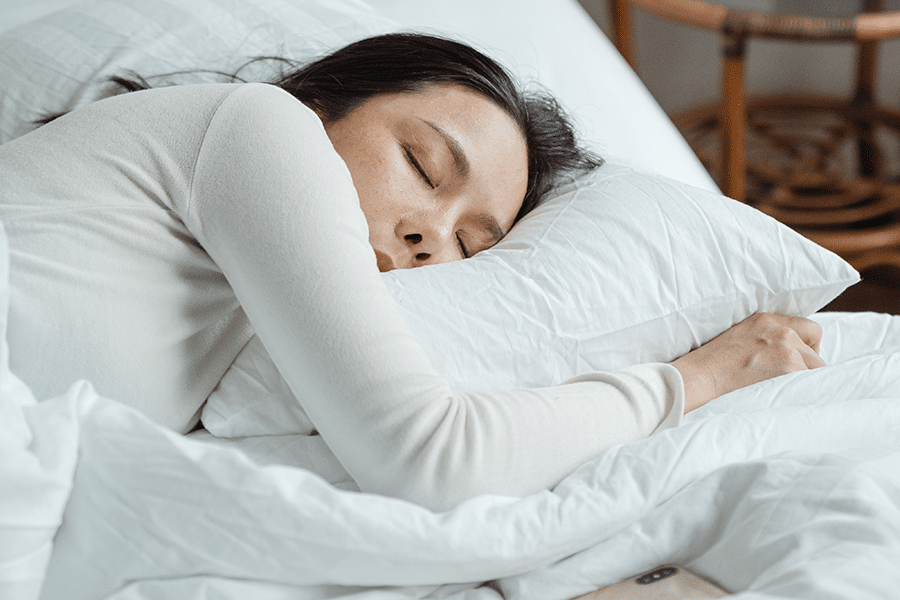Teeth grinding (the technical term being bruxism) can lead to a variety of adverse conditions from headaches all the way to causing a chip or break in your teeth. While bruxism can happen when you are both awake and asleep, it is especially dangerous when you are sleeping, particularly because you have no idea you are doing it. So, how can you tell if you are grinding your teeth at night?
What Should I Look For To Know If I’m Grinding My Teeth?
The only way to distinguish if you are clenching and grinding your teeth at night is to look for certain signs. Some signs you should look out for include TMJ discomfort, headaches, increased tooth sensitivity, jaw & neck soreness, ear-ache-like pain, and sleeping issues.
- TMJ (temporomandibular joint) discomfort – TMJ disorder is a dental condition that causes aching pain and poor muscle & joint function in the jaw. You may hear a clicking-like sound around the areas of your ears. Grinding your teeth can both cause and worsen TMJ disorder. They are often related conditions, a specialist at our partner oral surgery center Alfano Oral Surgery can help treat this.
- Headaches – Headaches, particularly ones starting at your temples, are heavily associated with teeth grinding at night. If you are waking up with headaches for multiple days, be sure to consult your local dentist.
- Increased Tooth Sensitivity – Since grinding your teeth chips away at your teeths’ enamels, affected teeth may have increased sensitivity when consuming hot or cold foods/beverages.
- Jaw, Neck, Or Face Soreness – On top of jaw pain, it is also possible for your face or neck muscles to feel sore after multiple nights of teeth grinding or clenching.
- Earache-Like Pain – Some toothaches can feel as though they are coming from your ear. If you feel as though you are suddenly getting earaches and it is coupled with any of the other symptoms on this list, it is important to notify your dentist next time you see them so they can attempt to solve your issue if it is dental-related.
- Insomnia / Sleeping Issues – Due to the nature of bruxism, you may be finding it harder to go to sleep and stay asleep.
Ask Your Partner Or Relative – If you sleep with a partner, they will most likely tell you if you are grinding your teeth in your sleep due to the swooshing noises most people make when their teeth grind. If you sleep by yourself but live with family or friends tell them to check up on you if they can and see if you are grinding your teeth at night. If you are unable to do so, the most revealing symptom mentioned above is constant headaches stemming from your temple.
Teeth Grinding Causes
Teeth grinding can be the result of many different factors. Some of the leading causes include:
- Age – Bruxism is common in children. Usually, the best way to get rid of bruxism in children is just to wait for them to outgrow it unless the issue is severe.
- Runs In The Family- Teeth grinding tends to extend from one family member to another.
- Stress – Anxiety and stress can cause a teeth grinding habit in individuals.
- Aggression – Overly aggressive and competitive individuals are more susceptible to grinding their teeth.
- Medications – Certain medications, mostly those used for depression, PTSD, psychiatric conditions, and other similar conditions, can cause individuals to grind their teeth more. This is due to certain ways your brain is stimulated when these types of drugs are taken.
- Sleeping Disorders / Night Terrors- Sleeping disorders such as sleep apnea and night terrors can lead to bruxism or elevate it if already occurring. This is because of the discomfort and stresses your body goes through if you. If you suffer from sleep apnea, our group is partnered with a dentist offering dental sleep medicine.
What Can Be Done To Help Prevent and Treat Teeth Grinding?
Prevention – The majority of people who suffer from teeth grinding do so due to stress and anxiety in their life. It is easier said than done, but taking time to try to relax yourself and cleansing negative thoughts will ease the stimulation in your brain causing you to grind your teeth while awake and/or asleep.
Treatment – If you do suspect one or multiple symptoms of teeth grinding are present, don’t be afraid to talk to your doctor or dental hygienist at your next appointment. They are trained to spot signs and symptoms of bruxism.
If you are diagnosed with bruxism, your dentist will get you fitted for a nightguard or dental appliance device. While these won’t necessarily cure your bruxism, they can help prevent the negative effects of grinding your teeth from occurring. Everyone’s dental needs are different, and your dentist will opt for the treatment they believe is the best for your quality of life and a bright smile. Contact our office today with any questions or to make an appointment.



